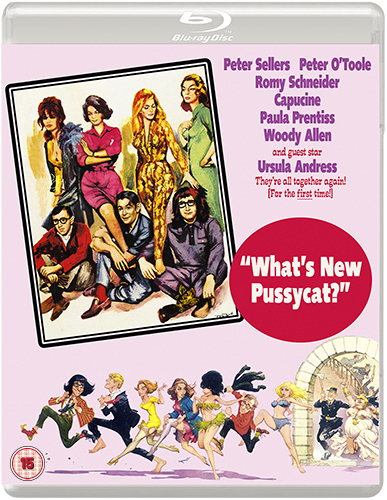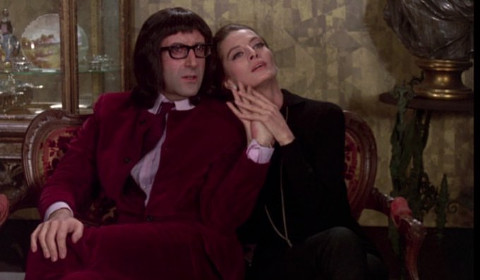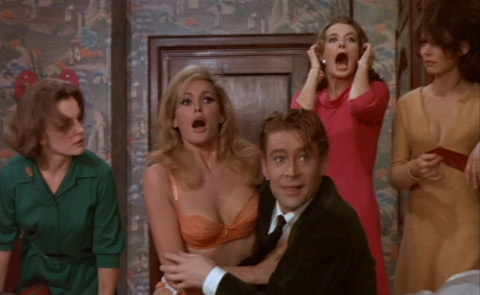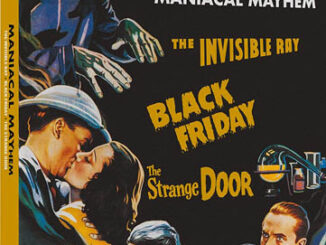What's New Pussycat (1965)
Directed by: Clive Donner
Written by: Woody Allen
Starring: Peter O'Toole, Peter Sellers, Romy Schneider
USA
AVAILABLE ON BLU-RAY: NOW, from EUREKA ENTERTAINMENT
RUNNING TIME: 108 mins
REVIEWED BY: Dr Lenera, Official HCF Critic
In Vienna, Motorious womaniser Michael James isn’t ready to get engaged to Carol Werner for fear he will still cheat on her when he’s married. To resolve his problem, he consults Dr Fritz Fassbender, a married psychiatrist who likes and can’t keep his hands off Renee Lefevre, another patient, though she’s in love with Michael. Fritz wants Michael to teach him the art of seduction. Then there’s Michael’s friend Victor Shakapopulis, an unlucky man in love with any female who’ll give him the time of day – who right now is – Carole….
Perhaps better known for its title song of the same name, What’s New Pussycat almost plays like a dry run for Casino Royale – no, I’m not talking about Daniel Craig’s first crack at the role of James Bond in 2008, but the madcap, incoherent 007 spoof made in 1967. Perhaps that shouldn’t come as much of a surprise, seeing as they share many alumni. It’s not quite as crazy as the later film, but your feelings on it may also be your feelings on this one. Whenever I do a 007 marathon [which is in the lead up to whenever the new one comes out], I always watch this Casino Royale too, as it does make me laugh and it’s certainly inventive even though I’m not sure that I’d call it a good movie. What’s New Pussycat is a film that, by rights, should have been amazing seeing as it paired O’ Toole, one of the hottest yet also most talented rising young stars of the time, with Sellers, one of the most brilliant comedians of the period and a huge star, with a script by no less than Woody Allen, debuting as both screen writer and actor. I was quite looking forward to seeing it as I adore Sellers and, like Austin Powers, have a distinct weakness for the music of Burt Bacharach. I was entertained, yet the film only sometimes seemed to catch fire the way that it should. It seems to be looked down on by some today as celebrating a very Swinging Sixties idea of love and sex, though in reality comes across more as a conventional morality tale saying how settling down is better than endless promiscuity – well, for the most part, as there are times where it seems confused about what it’s trying to say, something which is hardly surprising considering its fraught production where various folk seemed to have different ideas about the film. Sometimes it is indeed very funny with some great lines, but sometimes it also falls rather flat, while I have to say that Sellers isn’t anywhere near his best here.
It was Warren Beatty who started this project. He wanted to make a film about sex addiction [presumably something he already knew a lot about], the title being Beatty’s salutation when speaking to his lovers over the phone. Producer Charles Feldman was keen, but he didn’t want Beatty’s then girlfriend, Leslie Caron, to co-star. They asked Woody Allen, at this time a stand-up comedian with no film experience, to write the script. Allen agreed, on the proviso that he could also appear, but Allen made his role bigger then Beatty wanted, causing Beatty to threaten to quit. To Beatty’s surprise, Feldman let him leave and promptly gave his part to Peter O’Toole. Groucho Marx was to have played Dr. Fassbender, but at O’Toole’s insistence he was replaced by Peter Sellers. O’Toole, Sellers and director Clive Donner all made changes to the script. Sellers and Allen developed a rivalry, something not helped by people constantly mistaking Sellers for Allen. At one point an executive producer on the film, thinking that Sellers was Allen, reassured him that he wouldn’t let Sellers damage his picture. Sellers responded by improvising more and even persuading Feldman to give him lines and scenes that Allen had written for himself, reducing Allen’s part considerably. The film was shot in and around Paris between October 1964 and January 1965, where, at one point, co-star Paula Prentiss climbed up to the catwalk and started walking the beams, loudly called down to everyone on the set, “I’m going to jump”, and did so – but then a French technician grabbed her, and saved her life. The film was a hit, no doubt partly because of the song, though critical response was mixed.
Trippy renderings of the main characters lead in to a series of cat-related images plus a rainbow coming out of a peacock’s rear during the very art nouveau main titles, and I would imagine that quite a few reviewers who hate this movie say that these titles are the best thing in it. But the ‘60s really was the decade for cool title sequences – I wish they’d bring them back. We then have the only really stylish bit of Donner’s direction, as a domestic row goes on inside a large house but we stay outside to sometimes zoom in on certain moments. The rather violent argument is between psychiatrist Fritz and his formidable wife Anna, who’s furious that he didn’t come home last night and thinks that he’s been having an affair. “Was she prettier than me?” she asks, “I’m prettier than you” is the reply. He’s saved by a knock at the door and in comes Michael who, in flashback form, tells Fritz of his early sexual encounters, beginning with a teacher at school [the line “this can’t work, I’m, 34 and you’re 12” probably wouldn’t make it today, even though no attempt is made to make O’ Toole look younger]. And now he has pretty women throwing themselves at him and a job that’s a “lecher’s dream” as a fashion magazine editor, but he’s troubled because he wants to commit to Carol who keeps proposing to him, but his promiscuous nature gets in the way. Fritz doesn’t see that Michael’s problem is a problem, and wants to be like him. A psychiatrist who’s had “great success from shoving people in dark closets”, he’s no good with the opposite sex, but he keeps attacking patient Renee. I’m not a politically correct sort as you’ll no doubt have realised if you’ve been reading me for long enough, but I couldn’t help but bristle at the idea of a man repeatedly trying to rape a woman being done for laughs. Anyway, Fritz can’t take more than 15 minutes of hearing about Michael’s sex life so he shows him the door, but the two meet later at a strip club where Michael pulls Liz the main performer with absurd ease.
Liz turns out to be a neurotic who keeps trying to kill herself with pills, but never mind, Renee, a self-confessed nymphomaniac even though she has no interest in Fritz, also wants him. Also working at the strip club is Victor, who like Michael has a great job, helping strippers change clothes, but who’s even more of a loser with women. He really likes Carol, and maybe she likes him? Often the film seems to be most interested in parading the likes of Capucine, Paula Prentiss and Ursula Andress [who has an entrance to compare with her one in Dr No] about and having them act sexy, which wasn’t exactly a problem for this critic, but which makes the movie seem more like a male fantasy rather than a study of sex addiction. Of course Michael is jealous when Carol could be cheating, but the script never really tries to explore such archetypal contradictions in the character. But what is often just a series of random scenes with little seeming relation to each other does throw up some laughs. For every “huh?” moment which fails to come off like Michael playing cricket indoors, you get inspired insanity like Michael dreaming of Fritz playing Richard The Third surrounded by all of Michael’s women, and some genuinely funny sequences like a variant on Romeo And Juliet’s balcony scene [or should that be Cyrano de Bergerac?] where Fritz is shouting words of love up to Renee but she can only see Michael. Eventually everyone, including a few characters I haven’t even mentioned, shows up at a formerly quiet country hotel where the rooms are named after famous lovers, most of them unaware of each other’s presence. The resulting ‘in and out of rooms and cupboards’ farce is often chucklesome – the highlight being when Michael has to hide from all of his women one after the other, where both the humour and the idea of a lothario’s behaviour rebounding on him interlock very well. The following slapstick go-kart chase though, while fun, suddenly seems to end, as if they ran out of money to shoot all of it.
What’s New Pussycat would probably considered to be alarmingly sexist by some if released today. Most of the women characters are indeed treated like sex objects, but neither Michael or Fritz are admirable characters, nor do we seem to be asked to admire them. In fact poor Victor is the only one out of the three whom we like. We feel sorry for him, especially since Carol seems to be canoodling with him partly in an attempt to make Michael jealous. Allen’s role may have been drastically cut down, but he still gets some of the funniest scenes; buying a sports car because he’s told it will attract the ladies and then causing havoc with it because he never learnt to drive, calmly sitting down to eat his birthday meal in the exact same spot where Fritz is about to commit suicide, being rather afraid to take on somebody who grabs a book from Carol in a library, leading to a well staged bit of slapstick. Allen’s unique screen persona of the wisecracking, lovelorn coward is almost fully formed, it’s just not quite fully tuned yet. It’s nice to see O’ Toole enjoy himself in a comic role even though he often tends to make do with little more than a look of bewilderment on his face – yet when his character expresses actual love for Carol, we believe him. But Sellers just seems to be relying on speaking with a silly accent at the top of his voice, rather than making the most of what could have been an amusing spin on Sigmund Freud. Sometimes he’s saddled with lines like, “You’re a monster, and a monster in that order,” which normally he’d make funny simply by his delivery, but which here he fails to do much with. But lets give Sellers some slack – he was recovering from several heart attack at the time. And it’s amusing to see Andress laugh out loud for real when Sellers says about her character “knowing James Bond”.
Of course the very purple-dominated film revels in its ’60s outfits [check out the velvet jackets of the two leads] and interior design, and the Bacharach score is unsurprisingly tuneful and groovy. The Tom Jones title song is of course the one that becomes the main theme, but you also get to here several times Bacharach’s ‘Little Red Book’ performed by Manfred Man, and the Dionne Warwick-sung ‘Here I Am’ which might be one of the beautiful songs that ever came from the golden pens of Bacharach and lyricist Hal David. What’s New Pussycat has considerable worth as a time capsule. But it never really focuses, nor is it as continually hilarious enough to make this lack of focus not matter, despite definitely having its high points. It ends in as conventional a manner as possible, seemingly telling us that, yes, it’s better to have just one strong relationship and that sex without love is meaningless. But for much of what’s come before, the film seems to enjoy presenting all its sex without love as being so much fun that we’re not entirely convinced of its sincerity by this point – and then it confusingly and cheaply goes on to suggest that, actually, leopards can actually never change their spots anyway.
Rating: 









The only time that What’s New Pussycat was previously released on Blu-ray was in 2014 from Kino-Lorber on Region A. I reckon Eureka have used the same master but given it a new encode and maybe some touching up here and there. And, to be honest, it looks fine. There seems to be some very minor print fatigue on the sides of the frame at times, and certain shots, usually dark, appear softer than others. But grain is managed evenly, the colours pop out, and skin tones look perfect. Pretty good overall.
The Kino-Lorber only came with a trailer but Eureka have provided an audio commentary. Australian critics Emma Westwood and Sally Christie mention early on that they’re not going to examine the film through a ‘modern’ prism despite being female, and later on even bemoan the lack of access to similar films that today would be considered un-PC. My kind of critics! In fact this is an excellent talk track all-round, the two really properly ‘chatting’ in an easy going manner, and each one of them obviously having researched different aspects of the film. Biographies are limited and, while we learn about all sorts of related material from background detail to the critical reception, the duo are especially good at linking the film to certain others such as Shampoo, and providing just plain odd facts like Sellers hating purple so much he’d insist certain room were re-decorated – despite all the purple in the film. We even learn of an obscure sequel I didn’t know about starring Ian McShane. I hope these two return for more Eureka Blu-rays.
What’s New Pussycat is heavily flawed but in the end pretty fun anyway. Eureka’s disc presents it in probably its best home viewing release. Recommended With Reservations.
SPECIAL FEATURES
*Presented in 1080p from a high-definition digital restoration
*Optional English subtitles for the deaf and hard-of-hearing
*Uncompressed LPCM 2.0 audio
*Brand new and exclusive audio commentary by film critics Emma Westwood and Sally Christie
*Original theatrical trailer
*A collector’s booklet featuring a new essay by Simon Ward








Be the first to comment